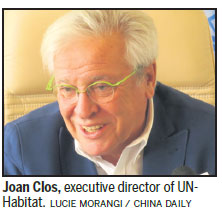Praise for China's development balance

UN-Habitat chief says nation has addressed growth demands and environmental concerns
Joan Clos, executive director of UN-Habitat, the United Nations agency for human settlement, has applauded China's success in balancing human development and urbanization.
Speaking in Kenya from the United Nations Office in Nairobi, Clos observed that the process of implementing its 13th Five-Year Plan (2016-20) has seen China purposely push forward sustainable development, consequently generating jobs for its people while promoting environmental conservation.
"By delicately balancing economic growth demands with people's complex needs, the country has shown it is possible to reach set aspirations as articulated in the national strategic plans. This is rare and commendable," he said.
Clos referred to recent efforts that aim to settle about 100 million migrant workers in towns and cities by 2020. "This policy is enviable as well as massive. I have no doubt that with China's past experiences and strong institutions, the project will be successful and become a point of reference for so many countries that have similar plans."
Besides these reforms, the executive director also commended the government's efforts to revamp at least 1,000 towns while maintaining their cultural characteristics. He said China has refined its urban policy, which allows people to live in cities with access to basic services and creates a sense of belonging and identity.

"One thing that I know is, during the urbanization process, it is easy to forget heritage. It is therefore important to keep the cultural identity of an area, and China has found a way of doing this."
Clos said these initiatives are expanding toward the rural areas and will probably affect 200 million more people. The ripple effect is huge and will have a big impact on improving China's standard of living, he said.
"The process of urbanization has become both urgent and complex. I therefore hope that the new initiatives going on around Beijing would not only consider the quantitative aspects, but also the qualitative aspects. I believe that the Chinese institutions are mature and would also take note of the lessons learned following two decades of rapid economic development.
"What the country needs are smart cities with suppressed levels of pollution but high levels of efficiency, especially in its transport sector," said Clos.
He said UN-Habitat signed an agreement with China during the Belt and Road Forum for International Cooperation in May in Beijing.
The Belt and Road Initiative is massive and promises to transform several cities along the route, Clos said.
"It definitely has the potential of assisting developing countries to plan and implement urbanization sustainably. Previously, the Silk Road influenced both economic and urban development, a characteristic that will be expounded on a large scale by the (Belt and Road Initiative).
"Cities are engines of economic development, as China has demonstrated in the last decade," he said, adding that the partnership with the UN agency will ensure that China's best practices are replicated.
He said China and UN-Habitat have a long-standing relationship and there are ongoing collaborations with a number of cities and leading universities in Beijing and Shanghai.
"We are ... partnering with the government for World Cities Day. I am going to be in Guangzhou for the occasion, held annually on Oct 31. That proves we have built a sustainable relationship, and we hope to strengthen it in the future."
lucymorangi@chinadaily.com.cn
(China Daily Africa Weekly 10/27/2017 page27)
Today's Top News
- EU has much to learn from China-Global South ties
- Xi holds phone conversation with Merz
- Xi stresses high-quality cultural-ethical advancement
- Trump halts Harvard's intl student enrollment
- Xi's visit gives impetus to our work
- Financing support enhanced for micro, small companies






























